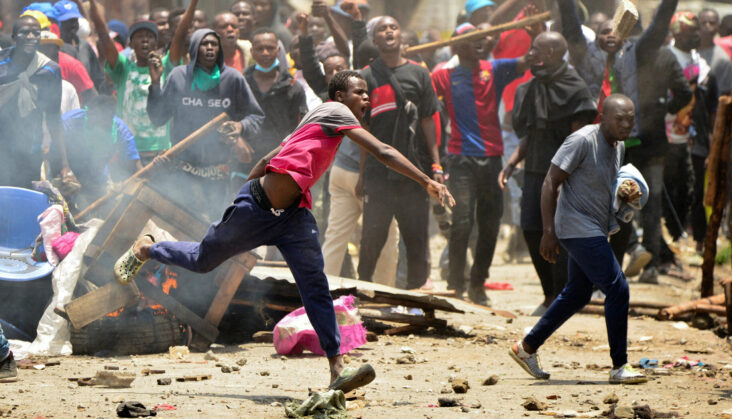Interior Cabinet Secretary Kithure Kindiki is proposing to change the Public Order Act through Parliament through a list of 10 conditions that will have to be met before a protest is approved.
It is not feasible for security organs to allow masses of people to roam streets and neighborhoods of their choice carrying stones and other offensive weapons while chanting political slogans and disrupting the daily activities of others. pic.twitter.com/3nmmwmyMC2
— Ministry of Interior | Kenya (@InteriorKE) March 26, 2023
The proposals include limiting the number of people who organise and participate in protests and ensuring that organisers pay for any property destruction.
Those participating in demonstrations will also be required to give their consent for organisation of a protest and provide the number of hours and routes to be used.
Kindiki says the proposed changes will ensure that future protests remain peaceful, and participants do not infringe on the rights of others who are not taking part.
“We want to ensure that the Constitution and Public Order Act are respected. Lives and property of non-protesters should be protected,” he says.
With the Ruto government having a slight majority in both the National Assembly and the Senate, and with some opposition legislatures having decided to support Ruto, the proposals are likely to be passed and signed into law.
What prompted these proposals ?
Opposition chief Raila Odinga has led demonstrations for the past two weeks in Nairobi that have turned violent, after the police engaged the protesters with tear gas and water cannons.
Last week, one university student in Western Kenya was shot dead by the police, leading to angry protesters looting shops and vandalising property and stoning the security officers.
The government feels overwhelmed and believes more stringent laws might help, Steve Musili, constitutional lawyer and political analyst, tells The Africa Report.
He, however, warns that some proposals will be difficult to implement if passed into law by Parliament.
The Kindiki regulations are an affront to the foundations of an open and democratic society
“You cannot tell demonstrators to ensure that there is peace. It is the responsibility of the police,” he says.
The current regime is on a mission to deny the opposition the political rights and freedoms gained after the 2010 constitution through the new proposals, says James Orengo, veteran constitutional lawyer and opposition governor.
“The Kindiki regulations are an affront to the foundations of an open and democratic society,” he says.
The right to protest
Under Article 37 of Kenya’s 2010 Constitution, every person has the right, peaceably and unarmed, to assemble, to demonstrate, to picket, and to present petitions to public authorities.
Furthermore, anyone who plans to protest is required to notify the police and ensure that participants are peaceful.
However, Kenya’s Inspector General of Police Japheth Koome says he has banned opposition protests across the country, despite receiving their notification in writing, and termed them illegal.
“The demonstrations are not allowed. We will arrest anyone who causes chaos,” he said at the start of the opposition protests on 20 March.
Despite the ban, opposition supporters have responded to the call of their leaders to protest against high cost of living and electoral injustice.
Odinga was defeated by Ruto in the August 2022 presidential polls, but claims his victory was stolen. He has vowed to lead the weekly demonstrations until his demands are adhered to.
“We are not going to be intimidated by the police. Our protests will proceed,” he told supporters in Nairobi on Monday.
However, in Odinga’s stronghold of Kisumu in Western Kenya, Governor Anyang Nyong’o said he was suspending opposition protests in the county after consultation with the party.
He said Kisumu protesters would go directly to Nairobi, the capital, for the twice weekly protests on Mondays and Thursdays. The governor later rescinded his communication.
President Ruto on several occasions has said he will not engage his opponent in any political talks, insisting that everyone should respect the law.

